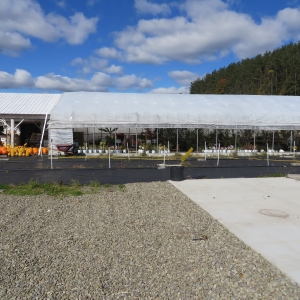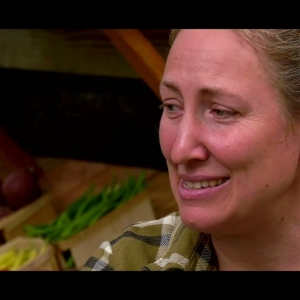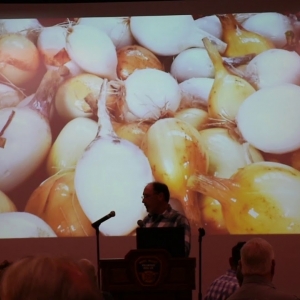Other Ag News: We Took Action to Defend Our Food System — Now It’s Your Turn
In anticipation of President Trump’s 100th day in office, a coalition of organizations from across the nation participated in a Week of Action between April 22 and April 29, 2025, to collectively highlight the disruption and attacks the administration has made on our food system and farmers. During the Week of Action, organizations coordinated efforts to call on Congress to step up and shield farmers and food workers from the chaos and uncertainty wrought by the administration. The coalition, including NSAC, has and is continuing to work together to both protect farmers and people from further harm and win positive policy change that will build a better food system for all.
This coalition shares a vision of a world where farmers, workers, and communities sustain a thriving food and farm system that nourishes people, stewards our environment, and builds strong economies. The week featured calls to action to highlight the various aspects of this vision and to take that message to Congress. Each day during this week of action, we responded to a direct threat to our food system from the Executive Branch. Efforts like this provide an opportunity to amplify our message and engage more broadly with partners and supporters.
This blog post provides a synopsis of the week’s actions and gives those who may not have participated in April the opportunity to make their voices heard now. It is still critically important that Members of Congress hear from constituents about these issues, and we hope readers will take action. It only takes a few seconds to click on the links to email your Member of Congress!
In Support of the Agriculture Resilience ActThe week kicked off with the introduction of the Agriculture Resilience Act on Earth Day, April 22. The last few months have seen brazen attacks on climate and environmental stewardship programs despite their clear benefits for farmers and communities.
Not only are farmers on the front lines of volatile weather events, but they are also among the most significant stewards of our nation’s water, soil, and air quality. To ensure our ability to grow food into the future, we need to resource farmers with the knowledge and support to weather any storm. That’s why we support the introduction of the Agriculture Resilience Act – a farmer-centered bill that incentivizes and supports the work family farmers are doing to build soil health, improve water quality, build robust and resilient businesses, and feed our communities.
This bill offers straightforward, incentive-based strategies for giving farmers the freedom to voluntarily improve the long-term health and resilience of their farms, supporting farmer livelihoods. With sufficient support, these strategies can be included in the next farm bill. Lawmakers must listen to farmers and advocate for their needs.
Will you join us in taking action today by asking your member of Congress to support the Agriculture Resilience Act?
The Need to Reinstate Local Food Purchasing ProgramsDid you know that for the last several years, farmers, schools, and food distributors have been working together to serve fresh, local food in schools and food pantries across the nation?
Until just a few weeks ago, the Local Food Purchase Assistance Program (LFPA) and Local Food for Schools Program (LFSP) at the US Department of Agriculture (USDA) were doing just that. Both programs were working to build stronger local supply chains and promote market access for smaller scale and historically underserved farmers and ranchers at the same time. During our week of action, we took the opportunity to make April 23rd a day of action for the reinstatement of the LFPA and LFSP.
On March 7, USDA announced the termination of over $1 billion in previously announced 2025 funding for LFPA and LFS. The loss of these investments will have lasting effects on local food networks. Farmers depend on these contracts, as many of them shifted their businesses to accommodate the new demand, and food banks and local schools will lose out on high quality local produce.
Will you join us and email your legislators to ask them to support making LFPA and LFSCC funding permanent through the Farm Bill?
Disaster Assistance for All FarmersFloods, droughts, and fires are some of the extreme weather events that can have devastating impacts on farms of all sizes. The federal government has established crop insurance, disaster assistance, and commodity programs to create a safety net that farmers can rely on, but small farms, multi-crop farms, and farms that mostly sell to local and regional markets often struggle to overcome bureaucratic hurdles and access these programs. With increasing weather disasters, more farmers are experiencing the effects of climate change, and with fewer resources available to help them cope with the losses.
Last year, Congress authorized $30 billion in disaster relief payments for farmers. Secretary of Agriculture Brooke Rollins directed $10 billion of those funds to the Emergency Commodity Assistance Program, but the implementation plan for the remaining $20 billion remains unclear. Our action for April 24th invited farmers to sign on to a letter delivered to Secretary Rollins to let her know small farmers also needed comprehensive disaster assistance. While the letter has been delivered, we invite concerned citizens or producers to call their Member of Congress to reiterate the need for crop insurance reform! You can also use some of the points for talking points when speaking to your Member of Congress while asking them to hold USDA accountable to the needs of all farmers. Here is a link you can use to find who your Member of Congress is and how to contact them.
Read the Letter to Secretary Rollins
Celebrating and Defending Federal WorkersAs NSAC worked with its members to prepare responses to Executive Orders and funding freezes from the White House that affected farmers and the organizations providing them with technical assistance, we also heard voices of empathy for the federal employees caught in the middle. These are hard working folks who care deeply about fulfilling the mission of their agencies but found themselves with their hands tied, vilified, and in many cases, fired. As the administration continued to gut USDA and attack our food system, farmers, and communities, USDA employees became a primary target of the administration.
Federal workers are the overlooked yet essential workforce that ensures federal programs reach farmers in rural communities across the country. Federal farm and food programs make healthy food more accessible, make farms more resistant to extreme weather events, help mitigate risk, provide emergency financial support, and fund conservation practices that improve farm businesses and our natural resources for years to come.
All of these programs require dedicated civil servants to administer them, folks ready and able to work directly with the farmers who use these programs. NSAC analysis revealed at that time that close to 30% of USDA employees have been or are at risk of being fired. That is 30,000 of the more than 97,000 employees USDA had at the beginning of the Trump Administration’s second term. This massive reduction in capacity will result in delays for all farmers accessing USDA programs, exacerbate administrative bottlenecks, and make USDA resources even harder to deliver across the country.
Our action for Friday, April 25, urged people to contact their members of Congress, demanding they rehire fired staff and fully staff all critical programs, and underscore the importance of the federal workforce.
Will you join us in emailing your member of Congress, asking them to urge Secretary Rollins to stop all the firings of USDA employees and fully staff all local offices?
Calling on Congress to Release Funds and Honor ContractsWe resumed the week of action on Monday, January 28, with a call on Congress to release funds and honor contractual obligations to farmers and organizations impacted by funding freezes. Beginning in January, the administration froze billions of dollars in federal funding for farmers and organizations, despite lawfully signed contracts and court orders directing funding to flow. Farmers with crops in the ground were left without markets, education, and food access programs for farmers and families were cancelled, and thousands of workers were abruptly laid off. While some freezes have been lifted since, the process and approach to freezing funds has been anything but transparent, affecting nearly every segment of food and agriculture. This should not be happening: Congress has abdicated both its responsibility and constitutional power to check the administration’s overreach and disregard for signed and legally executed contracts. They need to step up and demand that USDA honor its contracts and pay farmers and organizations.
Will you join us in demanding Congress release funds and honor contracts?
Young Farmers BriefingThe week of action concluded on April 29, officially marking the President’s 100th day in office, highlighting the real impact his policies have had on farmers with a virtual briefing organized by NSAC member, National Young Farmers Coalition. Members of Congress were invited to hear directly from the farmers impacted by the funding freezes.
This briefing featured farmers who shared:
- How the USDA grant freeze has affected farm operations, conservation projects, land access, and local food systems across the country,
- The firsthand impact of job losses, stalled reimbursements, and canceled contracts, and
- Concerns around the recent termination of USDA staff administering food and agriculture programs.
Of the many attendees, several Hill staffers took advantage of this opportunity to learn how current administrative actions are undermining bipartisan, congressionally authorized programs and destabilizing rural economies. This briefing is available for viewing.
Impact by the Numbers: Your Voice MattersWe were able to gather some numbers to measure the breadth of outreach the week of action was able to accomplish. These numbers are important because they show that there is broad support for Congress to step in and take action, for the funding freezes to stop, and for USDA staff to be rehired. We may not be able to know the true number of people who engaged with their representatives and government as a result of this week of action because some people may have taken action outside of the action portals, and of some people taking action outside of that week, the same way we hope you will take action now.
In sum:
- 457 people urged their members of Congress (MoC) to co-sponsor the Agriculture Resilience Act,
- 540 people called on Secretary of Agriculture Rollins to reinstate the Local Food Purchasing and Local Food for Schools programs,
- 175+ farmers called on USDA to offer more comprehensive disaster assistance for all farms,
- 121 people demanded that Congress and USDA work to immediately rehire staff who had been unfairly terminated,
- 2,085 people demanded that Congress immediately release all funding, honor all contracts, and halt indiscriminate federal staff firings (and I can see through at least one other organization’s action portal that an additional 1,140 people completed this action as well!), and
- 80+ people tuned into Young Farmers’ 100th Day in Office Briefing, with 41 farmers sharing their story with Young Farmers beforehand.
We also tracked the reach our week of action had on social media, where we got tens of thousands of impressions and interactions on different platforms, and more than 100,000 views on Instagram alone! All in all, that is at minimum, 4,423 touchpoints with Members of Congress, pressuring them to stand up and do more for our farmers and community members, and hundreds of thousands of people witnessing our efforts to protect our food system. But those numbers need not stay there. Action is still needed to continue making sure Congress hears from people about how the Executive Orders and actions coming from the White House are affecting rural and urban communities, disrupting our food system, attacking farmers’ livelihoods and the organizations that work with them to assist them in submitting grants applications and enrolling in programs designed to improve our food system and make it fair to all.
While the week of action has technically passed, our demands have not yet been met. It’s important that we keep up sustained pressure and visibility to ensure we are getting Congress’s attention. Take a few moments to email your Member of Congress about the issues that matter to you – it only takes 60 seconds!
The post We Took Action to Defend Our Food System — Now It’s Your Turn appeared first on National Sustainable Agriculture Coalition.
Signup for the Ag Newsletter
Get the freshest farm news, events and updates from in and around Cattaraugus County, NY at least once a month! Go signup!
Other ways to stay connected:
Get Involved in Farming
Resources for Starting a Farm in Cattaraugus County
Profile of Cattaraugus County soils
Agriculture Career Exploration
Questions about farming? Find out Who to Call











